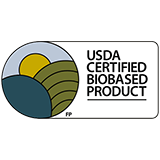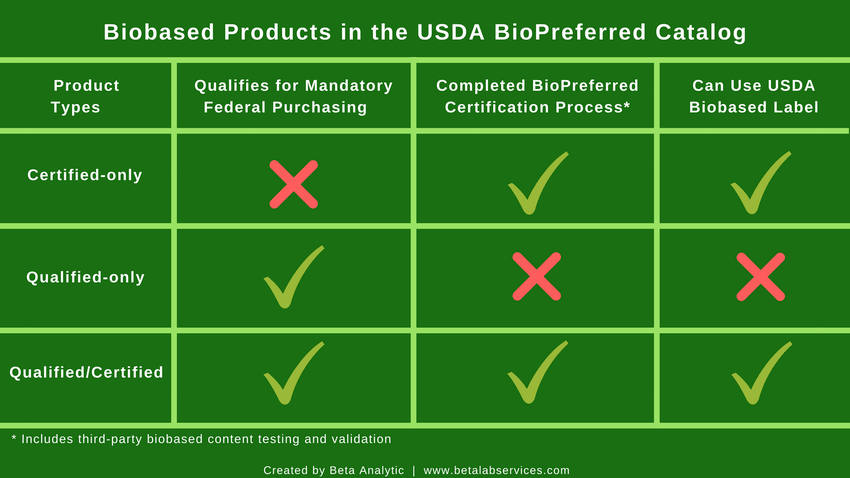How to Identify USDA Certified Biobased Bath Products
Consumer perception of personal care products is changing in favor of those formulated with natural ingredients. The United States Department of Agriculture (USDA) has included personal care items like bath products in its USDA BioPreferred Program®, making it easier for consumers to identify which ones are significantly made of materials from feedstocks, agriculture or forestry. Biobased bath products certified by the Program carries the USDA Certified Biobased Product label.
USDA Certified Biobased Products
 Biobased products certified under the USDA BioPreferred Program have undergone third-party biobased content testing and validation. They can use the USDA Certified Biobased Product label on the product’s packaging and marketing materials.
Biobased products certified under the USDA BioPreferred Program have undergone third-party biobased content testing and validation. They can use the USDA Certified Biobased Product label on the product’s packaging and marketing materials.
Aside from the logo or artwork, the label also includes the biobased content percentage of the packaging material and the product, as well as the texts “USDA Certified Biobased Product“. The letters “FP” that appear on the label signify that the product is also part of the Federal Procurement Preference initiative.

Bath Products – 61% Biobased Content
Under the USDA BioPreferred Program, bath products cover personal hygiene products such as liquids, gels and bar soaps but excludes products marketed as hand cleaners or hand sanitizers. Body washes or cleansing lotions are included in this category.
Manufacturers who want their bath products to be carry the USDA Certified Biobased Product label will need to make sure that the product is at least 61% biobased as measured by ASTM D6866 analysis. The Program clarifies that a higher percentage of biobased content doesn’t necessarily indicate superior performance, safety, or environmental impact.
For bath products to be biobased, they may have surfactants, essential oils or fragrance and other ingredients sourced from biological materials.
Biobased Surfactants
Although each type has a different chemical composition, bath products all contain a surfactant as an active ingredient. Surfactants are traditionally petrochemical-sourced. Studies have noted that exposure to petrochemical-derived ingredients can cause skin irritation on the surface level and disrupt physiological activity internally. 1
Aside from health risks, waste from petrochemical-sourced surfactants can also be damaging to the environment. When waste is discharged in bodies of water, it stops productivity of aquatic plants and disrupts the balance of the food chain. When aquatic animals are eaten by humans, it increases internal concentration of surfactants in the body. 1
There are researches claiming that surfactants sourced from renewable sources are less harmful and exhibits cleaning efficacy comparable to the traditionally produced surfactants. Renewable resources may even come at a much lower production cost, proving it to be much more advantageous than its petrochemical counterpart. 2
USDA BioPreferred Program
The USDA BioPreferred Program aims to promote the purchase and use of biobased products that in turn increases economic development, provide more jobs, and direct new markets to needed commodities. As of 2014, the Program’s economic impact includes $393 billion value added to the U.S. economy and 4.2 million jobs through direct, indirect and induced contributions. The BioPreferred Program currently has 97 product categories.
Sources:
1. Yuan, C. L. et al. (2014). Study on characteristics and harm of surfactants. Journal of Chemical and Pharmaceutical Research, 6(7), 2233-2237. Retrieved March 16, 2018.
2. Nagarajan R. (2013.). ‘Greener’ Surfactants from Bio-based Waste as Efficient Alternatives to Nonylphenol Ethoxylates. Retrieved March 16, 2018.
Beta Analytic is not affiliated with the USDA, the BioPreferred Program or ASTM. The ISO 17025-accredited lab provides fast ASTM D6866 testing and welcomes inquiries from interested parties, including USDA BioPreferred Program applicants. Please contact the lab for price inquiries and turnaround time options.
Examples of other products accepted in the USDA BioPreferred Program:
Pest control products
Bathroom and spa cleaners
Bed linen and towels
This entry was posted on Friday, March 16th, 2018 and is filed under Biobased Products, USDA Biopreferred Program .